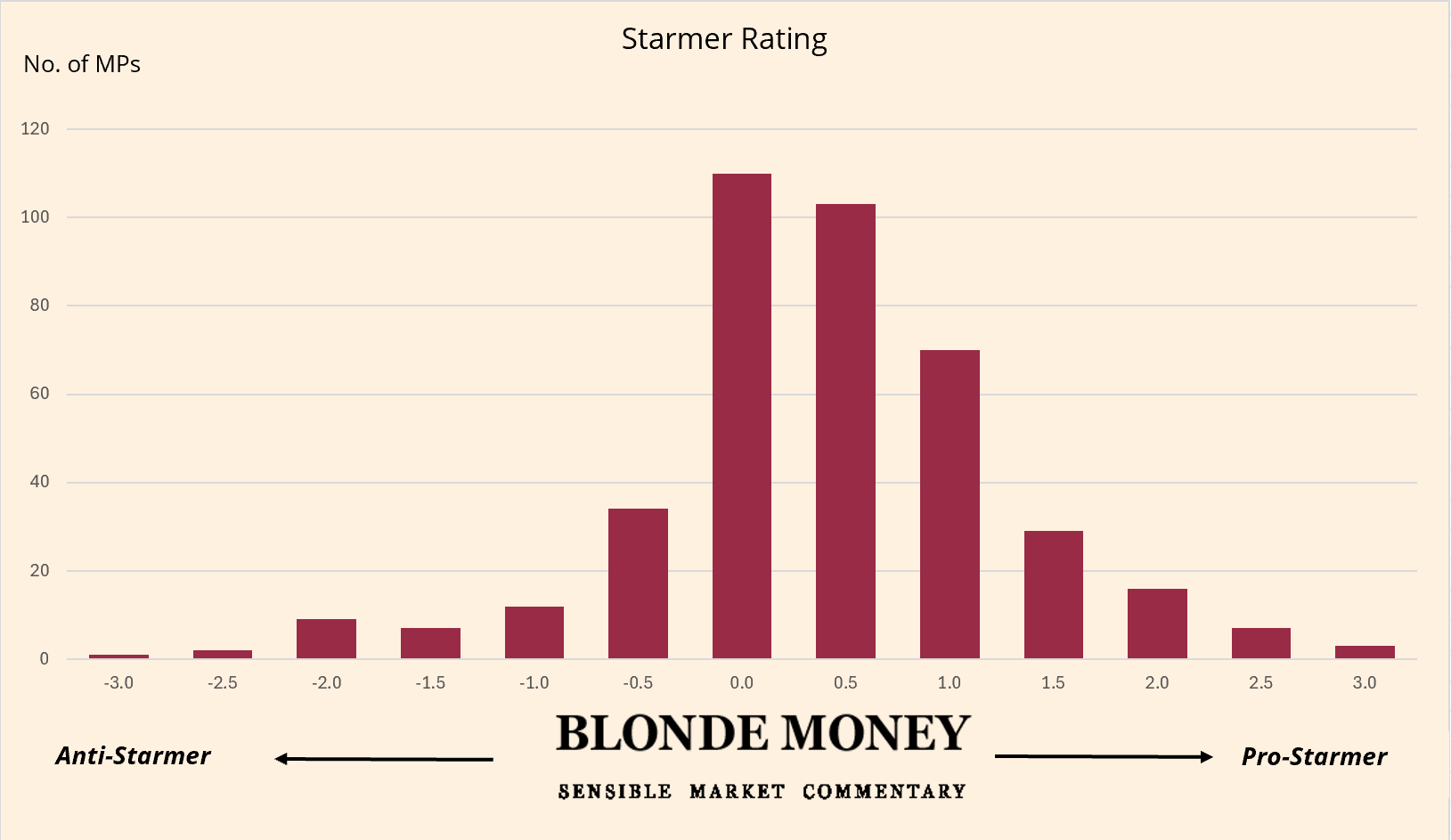
26th October 2025
UK: Anatomy of a Rolling Fiscal Crisis – Part 3

- The totemic Caerphilly Senedd by-election loss for Labour coupled with the inevitable cost-free protest vote election of Lucy Powell for Deputy Leader could not have come at a worse moment for Budget preparations.
- On Friday 31 October, the OBR delivers its final pre-measures forecast; after this, Reeves will know what number is required to meet the fiscal rules. She can do no further lobbying of how to interpret the past – only set a path for the future.
- By Monday 10 November, the OBR will deliver its initial post-measures forecast – essentially a judgement on whether Reeves’ shopping list of measures will pass muster. If not, there will be more HMT/OBR back and forth until it does.
- Except the shifting political landscape means that this is no longer just an optimisation problem between two economic institutions.
- The Caerphilly/Powell results serve as grist to the mill of any anti-Starmer faction within the Labour Party. Not left wing enough? Too anti-immigration? Too command-and-control in party management? Choose your argument (Lucy Powell mentioned all three) and call for Keir to change direction.
- The battle for the ideological soul of the Labour Party will now be played out in Budget negotiations.
- Hence reports of a “Mansion Tax” (1% levy on value of home above £2m) and “partnership NICs” for LLPs to make “those with the broadest shoulders pay their fair share”, a.k.a. wealth taxes to please the left wingers.
- Except the pragmatic centre-left also know that to soak the rich is to kill the golden goose – and not raise very much money by doing so. Hence talk of breaking the manifesto pledge and raising income tax by 2p in order to be more sure of finding £20bn to plug the fiscal hole.
- As Reeves attempts to square this circle, she must also navigate an increasingly fragile relationship with Starmer.
- He poached her no2, Darren Jones, and appointed his own economic adviser in Minouche Shafik. Shafik co-chairs the weekly “Budget Board” meetings with new Treasury Minister Torsten Bell.
- Despite this apparently convivial joint approach, there are already reports of “a power play between No.10 and No.11” – specifically on the proposal to scrap the oil and gas windfall tax after the industry lobbied for it to be wound down early and replaced by a new regime to encourage investment.
- Vested interests alongside an embattled PM and plenty of fresh cooks debating the economic broth make for even more pre-budget leaks than usual, as each side tries to pressure the other. This will confound the markets.
- Starmer must try to survive through this very public battle, aware that his enemies will pounce on any more blood in the water.
- He must please his MPs, his party members, his voters AND, let’s not forget, financial markets.
- Each of these constitutencies wants diametrically opposing policies.
- It would be a challenging task even for a personally popular Prime Minister.
- He must please his MPs, his party members, his voters AND, let’s not forget, financial markets.
- For Starmer, it will prove insurmountable. He will be gone within months, possibly before the end of the year.
- The change to the Labour Party 2025 rulebook only requires 20% of MPs to name a challenger in order to provoke a contest at any time, rather than just at party conference.
- A greater proportion than this were prepared to rebel on the welfare vote in July; even gutting the legislation at the last minute didn’t prevent 12% of Labour MPs from voting against it.
- Finding a challenger might be difficult for a party uncomfortable with regicide, but not impossible.
- Lucy Powell is a perfect stalking horse. She has her own mandate from party members and does not want to sit in Cabinet and be bound by collective responsibility. She could front a challenge simply to force a change of direction.
- There is one other key factor helping those who would remove Starmer: the party is now in government rather than opposition.
- Deposing Corbyn was difficult because it was a navel-gazing intra-party battle; changing a prime minister is easier because it becomes imperative for the country.
- An existential loss of public support for the leader of country, not just a party, creates its own momentum.
- Whilst the politics becomes more volatile, the economics does not stand still.
- As former Bank of England Governor Mervyn King put it in a rare public interview with Sky’s Trevor Phillips – when asked if he could discern a plan from the government: “No, and that is what worries me“… “What happens is the OBR produces just before the Budget, a number, one number, and then they look round for ideas – almost written on the back of a fag packet – about how you can raise an extra few billion or a few billion there. That is not a coherent tax strategy”.
- The Chancellor’s measures don’t happen in isolation.
- After three fiscal events, businesses and the wealthy will have seen enough of this government to divine its direction.
- The public will be in a state of shock once income tax rises – even if it is somehow sold as worse for the wealthy, with, as we expect, the top two bands going up by 5p rather than just the proposed 2p on the basic rate.
- The inevitable recession might help in bringing front end Gilt yields down but will risk steepening the curve through greater issuance as the automatic stabilisers kick in.
- Gilts and GBP are set to enter a volatile period whilst the politics plays out.



